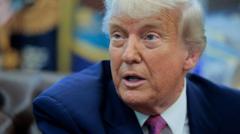Member nations of the World Health Organization (WHO) have successfully negotiated a pandemic treaty aimed at enhancing international readiness for health emergencies.
Countries Unite to Establish Groundbreaking Pandemic Treaty

Countries Unite to Establish Groundbreaking Pandemic Treaty
Historic agreement reached to prevent future health crises through global solidarity.
After three years of intensive discussions, the draft treaty is set to solidify frameworks for global health cooperation, focusing on preventing the missteps evident during the Covid-19 pandemic.
The agreement mandates that wealthier nations share essential data regarding pathogens and collaborate on vaccine and treatment technologies with developing countries. The treaty aims to create a more coordinated global response to pandemics, ensuring equitable access to vital health resources.
Although the United States withdrew from the negotiation process after former President Trump suspended its participation in the WHO, the treaty is expected to be adopted next month in a legally binding format. Experts in global health have expressed optimism regarding the treaty's potential, noting its significance as a multilateral agreement amidst a changing international landscape.
“This agreement reflects a recognition that health crises require collective action,” stated Nina Schwalbe, a global health consultant involved in tracking the treaty negotiations. “While it may not cover everything we hoped for, there are many foundational elements that can be strengthened in future agreements.”
The WHO first initiated discussions for the treaty in December 2021, hoping to foster a proactive global health environment in anticipation of future health threats. The finalized treaty marks a crucial step towards prioritization of global health solidarity and accountability among nations.
The ongoing commitment to enhance global health frameworks indicates a shift towards more collaborative approaches, even in the absence of major players like the United States. As the world navigates the aftermath of the pandemic, this treaty symbolizes a collective effort to better prepare for health emergencies ahead.
The agreement mandates that wealthier nations share essential data regarding pathogens and collaborate on vaccine and treatment technologies with developing countries. The treaty aims to create a more coordinated global response to pandemics, ensuring equitable access to vital health resources.
Although the United States withdrew from the negotiation process after former President Trump suspended its participation in the WHO, the treaty is expected to be adopted next month in a legally binding format. Experts in global health have expressed optimism regarding the treaty's potential, noting its significance as a multilateral agreement amidst a changing international landscape.
“This agreement reflects a recognition that health crises require collective action,” stated Nina Schwalbe, a global health consultant involved in tracking the treaty negotiations. “While it may not cover everything we hoped for, there are many foundational elements that can be strengthened in future agreements.”
The WHO first initiated discussions for the treaty in December 2021, hoping to foster a proactive global health environment in anticipation of future health threats. The finalized treaty marks a crucial step towards prioritization of global health solidarity and accountability among nations.
The ongoing commitment to enhance global health frameworks indicates a shift towards more collaborative approaches, even in the absence of major players like the United States. As the world navigates the aftermath of the pandemic, this treaty symbolizes a collective effort to better prepare for health emergencies ahead.





















